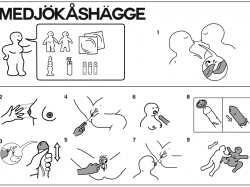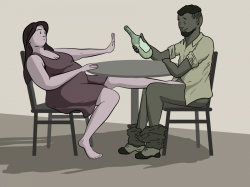Tag Archives: consent

Sex education: what I wish I’d learned
In my sex education classes at school, I was told that sex was this:
A man puts his penis in a woman until he ejaculates.
There was a lot of stuff surrounding that, of course, all of it important: how to avoid getting pregnant, or reduce the risk of an STI. How the sperm meets the egg. Why menstruation happens. But at the heart of it was that: a man puts his penis in a woman. Train goes in tunnel, you know?
Everything I learned was grounded in that train-in-tunnel thing. Sure, we got timetables, instructions on emergency exits, and a map to where the buffet car was, but we were still always focused on the train.

Two things: the ‘right’ kinds of sex and porn
For as long as we’ve been enjoying sex and porn, we’ve also had to listen to people telling us that there’s a ‘right’ or ‘wrong’ way to enjoy it. These two posts highlight the problems with this.
Get stuck in.

“But I thought he was a nice guy?!”
This post – which includes frank discussion of rape and sexual assault, fyi – has been swirling round in my head for a while. I almost wrote it a few weeks ago, when student George Lawlor feigned horror at being asked to go to consent classes and held up a sign saying ‘this is not what a rapist looks like.’ Then I almost wrote it again after watching the BBC3 programme ‘Is this rape?’ Now a number of porn performers have come forward about James Deen and – because I think it’s important to support people who speak out – I figured now’s as good a time as any. I believe them, obviously. Please read their stories:
I don’t want to put words into their mouths or make any assumptions about their experience, which is why I’ve put all these links at the beginning of the post so you can read, and offer your own support however you like.
From now on the rest of this post is not specifically about any individual – just our response to hearing someone’s personal story of rape or assault. Specifically, it’s about this phrase:
“But I thought he was a nice guy?!”
It comes back to the George Lawlor thing: ‘This is not what a rapist looks like.’ Let me tell you about some nice guys I have known.

Bondage kits, anticipation, and part two of a sex story…
A couple of weeks ago I put up the first instalment of a 2-part sex story involving a bondage kit, and the sexy anticipation of the build-up to getting something hot delivered to your door. In it, the main character falls for Zoe – a dominant with a penchant for spanking and bondage. Click the link above to read part one, which is filled with sexy shivers of anticipation, then read below for the climax, so to speak. It’s by the brilliant @waitingirl13, and I think it’s a gorgeous way to round off the tale…

How to say no (to things that aren’t sexy)
“Do you want another biscuit?”
“Ah, no I’m OK thanks. I’ve had five and I had a big lunch – I’m really full.”
“Sure?”
“Yeah, I’m sure thanks.”
“Go on – they’re delicious!”
“I know. I just…”
“G’wan.”
“OK, thanks.”
And then I sit and eat the biscuit and think ‘for fuck’s sake, I am a grown up. I should be able to decide whether I want a fucking biscuit.’ But then someone will pass the plate around again, and I’ll take another, because I don’t want to be rude. And by the end of the day I will be so sick of biscuits and so sad that these things I love very much (biscuits) have been ruined by the fact that I’ve had them politely shoveled into my face alongside the cup of tea that I don’t really like either.
This isn’t a metaphor for sex.